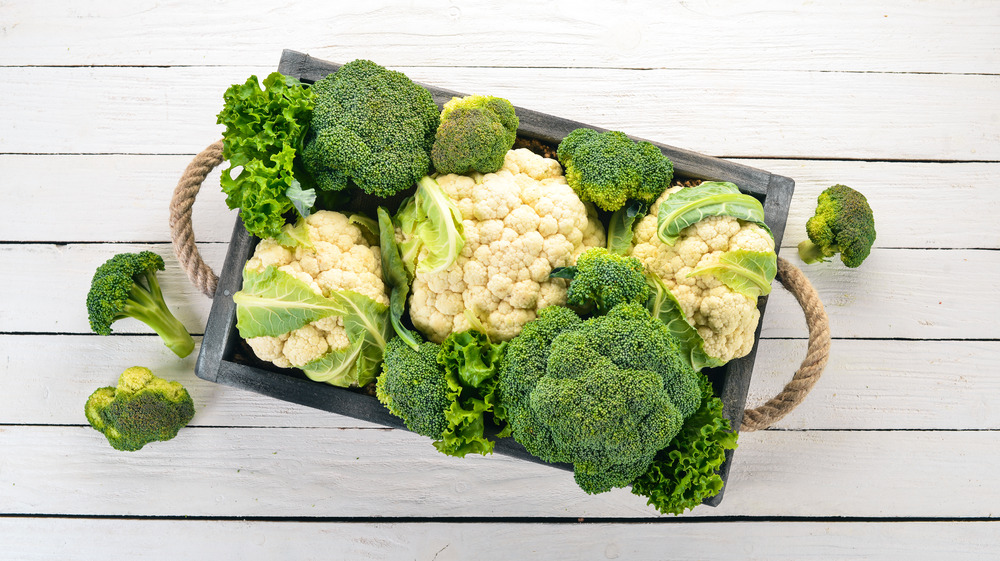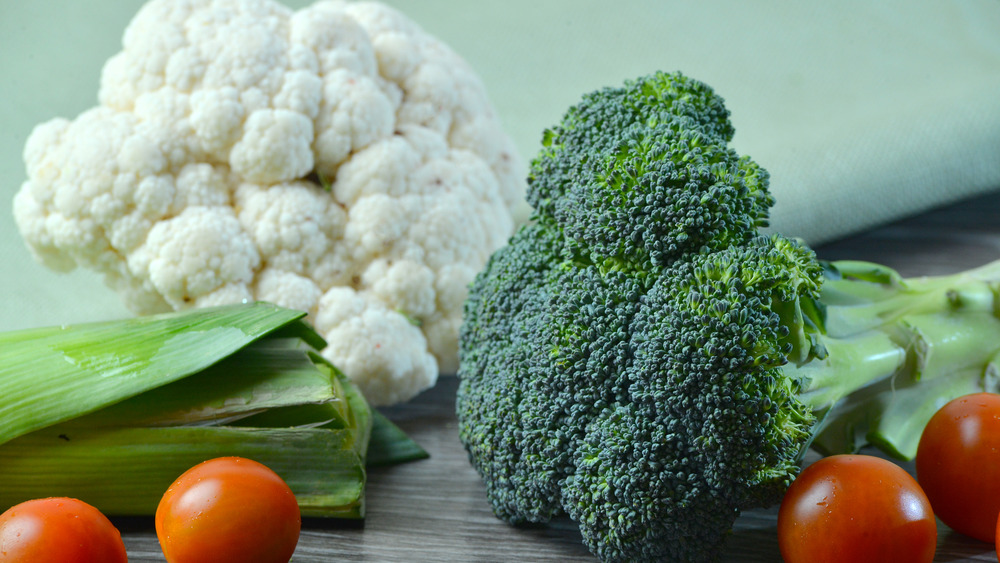Is Cauliflower Better For You Than Broccoli?
In 2020, We're Smart World named cauliflower the Vegetable of the Year, thanks to its rising popularity among health-conscious shoppers. Cauliflower may be all the rage right now, but it appears that dinner-table classic broccoli isn't going anywhere, either. Why? Whichever vegetable you prefer, the versatility of either option is unmatched compared to other healthy sides. Whether you're making a cauli-based mac 'n' cheese or a broccoli rice casserole, both of the veggies have immense nutritional properties that are easy to seamlessly blend in with any meal — even the kids might eat their greens (or whites) without any complaints, so long as any evidence of a vegetable is buried beneath a layer of cheese.
But with cauliflower quickly gaining steam in stores and on shopping lists, we have to pose the question: Is it really that much better for you than broccoli? Sure, cauliflower is adaptable and an easy substitute in traditional junk food meals — no one is out here making broccoli buffalo wings, after all — but broccoli has long been considered one of the freshest, nutritionally complete veggies. Let's see if cauliflower can stack up to the steep competition.
Cauliflower and broccoli come from the same family
Given the similar shape and size of broccoli and cauliflower, this may not come as a surprise, but the two popular veggies are actually from the same Brassicaceae family. This means that if you took the color out of the equation, broccoli and cauliflower are actually quite comparable on paper. There are tons of similar benefits between the two cruciferous veggies because of their common roots, reports Greatist.
Both vegetables contribute to overall health in several different ways, but the two have some noteworthy benefits in common. Healthline explains that both contain a decent amount of fiber in a single serving, which contributes to generally improved heart health and function.
Cauliflower and broccoli also both contain a large amount of antioxidants that may even help protect against cancer, inflammation, and disease. If the overall health impact is a major selling point for you, cauliflower may be slightly more favorable due to its high levels of "protocatechuic acid, coumaric acid, and vanillic acid," notes Healthline. That being said, broccoli is sure to give your immune system a boost with its own nutritional benefits, too, so this one may just come down to taste.
There are still some nutritional differences between broccoli and cauliflower
Despite the similarities between cauliflower and broccoli, the nutritional content isn't exactly identical. Depending on what you're looking for from your veggies, you may want to opt for one over the other.
While both veggies have concentrated amounts of fiber, broccoli may be better for your gut health in the long run. According to PureWow, one cup of broccoli has 9.6 percent of the recommended daily intake for fiber, while cauliflower lags behind at 8.4 percent. And if immune-boosting properties are important to you, broccoli definitely takes the lead with 90 percent of the recommended daily value for vitamin C in one cup, compared to cauliflower's 57 percent (via Healthline).
But if you're counting your carbs, cauliflower takes the cake at just 5 grams per cup compared to 6 grams for the same amount of broccoli. One gram may not seem like much in the grand scheme of things, but if you're following a hyper-specific diet like keto, this may be enough to convert you to Team Cauli once and for all (via Eating Well).
Still not sold on which side is the better bet for you? While it's slightly more expensive, you can pick up some broccoflower instead, which is essentially a hybrid of the two packed with fiber, and with even more nutritional bang for your buck (via The Spruce Eats). Indecisive shoppers, rejoice!


